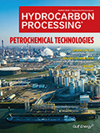Videos
ehsAI
Maire Tecnimont S.p.A. subsidiary, Tecnimont S.p.A., as majority leader of the consortium including MT Russia LLC, Sinopec Engineering Inc. and Sinopec Engineering Group Co., Ltd Russian Branch, has signed an EPSS contract with Amur GCC LLC, a subsidiary of PJSC Sibur Holding.
Siemens Digital Industries Software, a business unit of Siemens Digital Industries, is a leading global provider of software solutions to drive the digital transformation of industry, creating new opportunities for manufacturers to realize innovation. With headquarters in Plano, Texas, and over 140,000 customers worldwide, we work with companies of all sizes to transform the way ideas come to life, the way products are realized, and the way products and assets in operation are used and understood. For more information on Siemens Software products and services, visit https://www.sw.siemens.com/en-US/.
What is the future role of a process technology licensor? Recently, Lee Nichols sat down with Lummus Technology’s President and CEO, Leon de Bruyn, to answer this question. They discussed Lummus’ first year as a standalone company, recent changes in the market, the acceleration of the energy transition and digitalization, the outlook for technology licensors and a number of other important topics.
Why co-process in the FCC? The flexibility of the FCC unit makes it a logical location in the refinery for co-processing the renewable feedstocks demanded by the transition to more sustainable energy production. Find out more about how Grace is supporting multiple refiners who are currently routinely co-processing greater than 10% renewable feedstock and the feedstock challenges solved by lab and pilot testing, catalyst system management, and extensive technical support.
Honeywell UniSim Design is a process simulation and modeling platform that helps engineers create steady-state and dynamic models for plant design, performance monitoring, troubleshooting, business planning, and asset management. Learn more: http://hwll.co/UniSim
World oil markets are rebalancing after the Covid-19 crisis spurred an unprecedented collapse in demand in 2020, but they may never return to “normal”. Oil 2021, the IEA’s latest medium-term outlook, explains why. Rapid changes in behaviour from the pandemic and a stronger drive by governments towards a low-carbon future have caused a dramatic downward shift in expectations for oil demand over the next six years. This is forcing hard decisions on oil-producing countries and companies, which are reluctant to leave resources untapped or to install new capacity that would only sit idle. Could oil demand peak sooner than expected? Or is the world heading into a supply crunch? What will the implications be for the refining industry and trade flows? Oil 2021 tackles these questions by analysing oil market data, trends in investment and technology, and government policies. The report provides a comprehensive outlook for global supply and demand to 2026 and explores the vast challenges and uncertainties that lie ahead.
Alkylate is a valuable, clean-burning, octane-boosting gasoline blending stock that is becoming increasingly important in the green economy. Unfortunately, traditional alkylation processes utilize corrosive and toxic catalysts such as hydrofluoric acid and sulfuric acid, and these chemicals pose serious safety and environmental concerns while significantly driving up the costs of safety and maintenance for refiners.
Well Resources’ safe and sustainable Ionikylation technology utilizes a non-corrosive composite ionic liquid catalyst to produce high yield, superior quality alkylate. All Ionikylation process equipment is manufactured using carbon steel and the system is operated at moderate operating conditions.
Ionikylation was first commercially demonstrated in 2005. Since then, six commercial units ranging from 50,000 to 300,000 metric-tpy have been constructed, including the world’s first successful revamp from an existing hydrofluoric acid-based alkylation unit. Several new units have been have been licensed and are under construction.

- China's Wanhua Chemical starts operation at new east China cracker 4/4
- Brookfield Infrastructure announces the acquisition of Colonial Enterprises for $9 B 4/4
- PBF restarts some units at Martinez refinery after February fire; fire-damaged units remain shut 4/4
- Japan to curb gasoline prices from June to cushion U.S. tariff blow 4/4
- Evonik presents innovative "Debonding on Demand" concept for more sustainable bonding 4/3
- Oil, gas and refined product imports exempted from Trump’s sweeping tariffs 4/3




